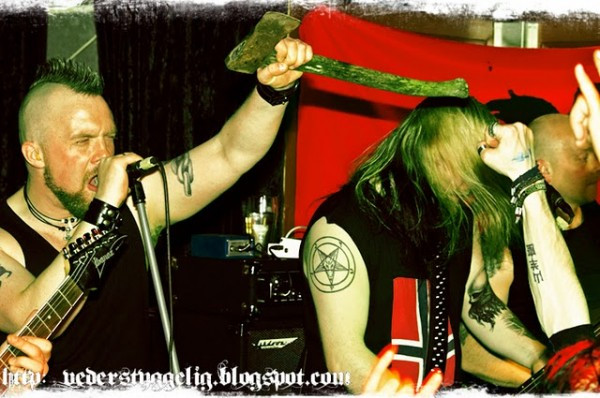
(Andy Synn is back with his lucky 13th SYNN REPORT.)
Norway’s Elite have a lot to live up to. With their chosen moniker, they have set themselves up to be seen either as foolish pretenders to black metal’s mystic might or as battle-hardened warriors whose very skill with their chosen muse makes them truly worthy of the title they have chosen.
Just as challenging, no matter their own prowess, is the fact that their sound treads ground already bloodied by the storms and sacrifices of some of their country’s greatest warriors. This battlefield was once walked by giants such as Immortal, Enslaved and Emperor, each of whom left blood and chaos in their wake, before moving on to new worlds to sow their seeds yet further.
For Elite, however, there is no thought of following Immortal into the halls of myth and legend, no desire to lose themselves in eldritch contemplation and progression like their forebears Enslaved, no sense of legacy and majesty that might make them challenge the rule of the Emperor. No, Elite are happy only on the battlefield itself, running rampant over their opponents and challenging the mightiest of warriors to single combat, for death or for glory.
Where their forebears have abandoned the battle, moving further away from the bleakness and blackness of occult warfare, Elite remain yet upon the field, collecting the weapons and the bones of the fallen, paying tribute to the lost and the damned, honing their skills over and over to perfection. Their ambition is not to carve out a kingdom for themselves as their ancestors did, but to prove themselves in combat, to face all challengers and crush them with metallic power and primal ferocity. This is not a lack of ambition, merely a different form of it, a form where bloodshed and brotherhood remain more important than majesty and acclaim. (more after the jump . . .)
That which was left behind by others has been taken up by Elite, not scavengers, but scholars of the battlefield, learning and adapting their martial skills to ever remain truly amongst the elite of black metal’s warrior brethren.
Kampen – 2004
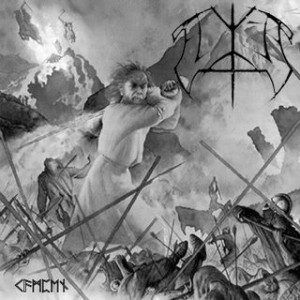 Raw and unrefined, the debut from Elite manages to deliver both traditional black metal atmospherics and expansive song arrangements in a tightly written yet aberrantly composed package. None of the album’s six songs is under six minutes, with closer “Fanget i Vrede” sprawling grandly past the 13 minute mark. A hysterical fever drives the song, a virulent lunacy manifesting in the aching, frustrated guitar work that drags and crawls with wounded, manic fervour.
Raw and unrefined, the debut from Elite manages to deliver both traditional black metal atmospherics and expansive song arrangements in a tightly written yet aberrantly composed package. None of the album’s six songs is under six minutes, with closer “Fanget i Vrede” sprawling grandly past the 13 minute mark. A hysterical fever drives the song, a virulent lunacy manifesting in the aching, frustrated guitar work that drags and crawls with wounded, manic fervour.
Opener “Bersekerens Manifest” hisses and crackles with misanthropic passion, its unnerving, punky opening leading to a murderous display of blast-beat ferocity and needle-sharp tremolo guitars. The steady and unrelenting march of the song’s mid-section, pulsing with malevolent bass and venomous vocals, gives way to a steadily building sense of menace which eventually explodes once more into blackened detonation of filth and fury. The song closes with a grandiose series of chords which conjure up haunting folk themes imbued with distorted metallic power.
“Tusen Ar I Lysets Void” conjures up a deeply mournful lead to open, whose weeping lamentations quickly becomes lost in a blizzard of cold, atonal notes and fractured chords. Turbulent and complex, and featuring a truly possessed vocal performance from front-man Bent Arne Mathisen, the song is an oppressive and claustrophobic arrangement of stabbing riffs and unceasingly vicious drumming which transforms from sorrowful distress to callous antagonism at the drop of a hat
The chaotic primitivism of “Kampen for Vårt Norroene Rike” sees the band grinding out viscous rivers of thick, molten guitars while the ragged vocals scream and screech with nebulous, unfocused rage. Classically inspired acoustics provide scattered moments of elusive calm amidst the torrents of apoplectic fury as the constantly shifting tempos add peaks and valleys of soaring emotional upheaval and deep, anguished suffering. Mathisen’s sand-papery vocals reach new heights of spite and rancour perfectly suited to the jagged, barbed work of his comrades in arms, their individual performances coalescing into an agonised construct of blood-stained barbarism.
A refined primitivism dominates the record, an atmosphere of noble savagery that planted the seeds of growth and progression which would eventually germinate into the dark magnificence and martial pre-eminence that would characterise the band’s later years, their increasing skills retaining and refining the merciless aggression that made them so feared and respected by their allies and their enemies alike.
Sample Song: “Kampen for Vårt Norroene Rike”
[audio:https://www.nocleansinging.com/wp-content/uploads/2011/07/04-Kampen-for-Vaart-Norroenne-Rik.mp3|titles=Elite – Kampen for Vårt Norroene Rike]Bekmørkt – 2005
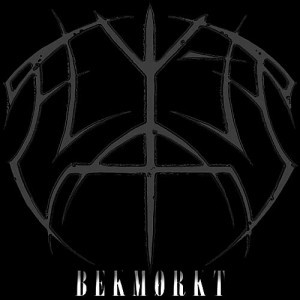 Limited to a mere 1000 copies, the heretical hymns of “Bekmørkt” bridged the gap between the berserker energy of their debut and the predatory darkness of their sophomore release with four songs of skin-peeling intensity and sincere, sickening blasphemy. The thinner production gives the songs less power, yet showcases a colder and sharper guitar sound which bristles with rabid energy.
Limited to a mere 1000 copies, the heretical hymns of “Bekmørkt” bridged the gap between the berserker energy of their debut and the predatory darkness of their sophomore release with four songs of skin-peeling intensity and sincere, sickening blasphemy. The thinner production gives the songs less power, yet showcases a colder and sharper guitar sound which bristles with rabid energy.
Propulsive and vital, “Antican” storms and grooves in equal measure, thrumming bass lines rounding out the garrotting tremolo-picked guitars, while the vocals are clearer and more powerfully enunciated expulsions of sacrilegious sadism.
The malignant and vehement riffs of “Misteltein” provide a cavalcade of devastating musical ignominy, a forceful demonstration of blackened ferocity over which Mathisen continues to deliver demonic tirades of pagan profanity.
“Stanken Av Hyklers Blood”, the longest and most drawn out musical excursion on the EP, delves deeper into more atmospheric waters, binding rumbling bass lines to a series of less aggressive, yet more expressive, chord progressions and maddening taunts of insane malediction. The drumming of Rainer Røreng continues to impress, bouncy and nuanced when needed yet able to explode with stunning violence without warning, while the thinner production, coupled with the more progressively inclined and restrained composition of the material, also serves to exhibit the importance of Chris Rudi Lind’s performance on the bass, his subtle contributions serving to elevate the song time and time again.
Beginning with a hellishly guttural vomit of vocal nastiness, “Dypet” has a thrashier vibe, mixing tougher, down-picked sections of full-bodied riffage with the speedy lash of blackened tremolo guitars. Hypnotically winding bass lines and snatches of perfectly precise, looping drums ensure the song buries itself in the listener’s subconscious like a horrific nightmare of sinister chords and hate-filled vocal venom.
Sample Song: “Dypet”
[audio:https://www.nocleansinging.com/wp-content/uploads/2011/07/04-Elite-Dypet.mp3|titles=Elite – Dypet]Bifrost – 2006
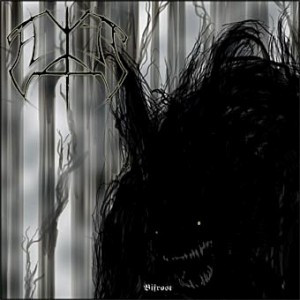 Elite’s second album is a true classic of underground (and under-rated) black metal. Harnessing their vicious, primal sound to a more powerful, riff-based aesthetic, the drums clatter and crush with greater power while Mathisen’s bestial snarl is placed front and centre, grown in size and power from the croaking, at times strained, howl of their debut. The guitar tone bristles with electric excitation while the songs are shorter and more violent affairs, the band having refined their blackened assault and sharpened their claws for maximum lethality.
Elite’s second album is a true classic of underground (and under-rated) black metal. Harnessing their vicious, primal sound to a more powerful, riff-based aesthetic, the drums clatter and crush with greater power while Mathisen’s bestial snarl is placed front and centre, grown in size and power from the croaking, at times strained, howl of their debut. The guitar tone bristles with electric excitation while the songs are shorter and more violent affairs, the band having refined their blackened assault and sharpened their claws for maximum lethality.
The scalding hail of razor-sharp tremolo guitars and frenzied drumming that begins “Aerolos” recall the early days of Enslaved. Mid-way through, the song shifts gears into groovy, down-picked thrash dimensions, shifting and expanding the dynamic in a natural, organic manner before accelerating once more in a flurry of tumultuous kick drums.
Follow-up “Take” matches a downcast, depressive atmosphere with oaken solidity and powerful guitars reminiscent of old-school Immortal, delivering moments of calm, misty reflection to break up the scathing guitars and scalding vocals. The song’s mournful chorus is of particular note, a primal scream of loss and anguish that creaks and shudders with emotional upheaval.
“Vikingfjord” marries a primitive, instinctive vibe to a polished and clear sound, delivering a mix of captivating riffs and deep, booming bass-lines whose sharpened precision and brittle, icy crunch serve to summon the ferocity of nature’s vital forces. The channelling of nature’s icy wrath continues through and permeates the frenetically paced “Isberg”, which rides the hurricane winds of crisp, icy riffage, tense, arduous bass-lines and a despairing undercurrent of bleak melody at a breakneck pace, seemingly always on the edge of collapse.
The album’s title track “Bifrost” bursts through in a devastating hail of frenzied notes and pounding drums before settling, juggernaut-like, into a marching, stop-start rhythm. The song’s progressive inclinations and prominent bass work give it a sense of prowling menace, all shadowy claws and rending teeth. Closer “Krampetak” revisits this sense of brooding, animal discontent, beginning as a dreadful and agonising crawl of blackened chords and rasping, dying vocals, transforming mid-way into a chaotic avalanche of unflinching aggression, only to descend once more into a lurching, tortured stagger of wounded, bleeding guitars and howling vocals to close out the record.
Sample Song: “Take”
[audio:https://www.nocleansinging.com/wp-content/uploads/2011/07/02-Take.mp3|titles=Elite – Take]We Own The Mountains – 2008
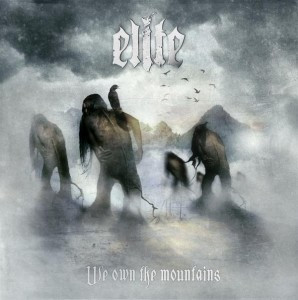 Elite’s latest record marries crystalline sonic clarity to a sense of haughty, martial arrogance, their icy, punishing sound forged in the fires of perdition. Measured and majestic in scope, yet bruisingly muscular in delivery, the record sees the band further updating their core black metal sound for a new era; like their countrymen in Vreid, they maintain close links with their ancestral forebears while harnessing their own brawn and heart to craft a form of black metal that is wholly individual and purely Elite.
Elite’s latest record marries crystalline sonic clarity to a sense of haughty, martial arrogance, their icy, punishing sound forged in the fires of perdition. Measured and majestic in scope, yet bruisingly muscular in delivery, the record sees the band further updating their core black metal sound for a new era; like their countrymen in Vreid, they maintain close links with their ancestral forebears while harnessing their own brawn and heart to craft a form of black metal that is wholly individual and purely Elite.
Opener “Volvens Vinterseid” immediately showcases the band’s newfound grasp of live-wire dynamics, the interplay of contrasting and interlocking guitar parts constructing a spiky, compelling groove while Mathisen’s rabid vocals hold court with a newly acquired sense of imperial disdain for the weaknesses of others. Indeed, his commanding tones have taken on greater prominence and importance than ever throughout the album as a whole, his delivery matching barbaric aggression with callous, calculated control.
The band prove their unflinching grip on brittle, flesh-tearing hooks with the sinuous melodies that wrap around “Rovnatt”‘s core of crunchy, mid-paced riffage and snarling, broken-glass vocals. The opening refrain of moody, chanted, clean vocals creates an atmosphere of bleak, frost-bitten despair from which the rest of the song proceeds with a sense of linear growth and progression, the band unafraid to experiment with an array of subtle textures and complex changes in structure without losing their deeper warrior identity. Each and every whip-crack snare-stroke strikes with martial precision, controlling and connecting the array of barbed thrashy riffs and soaring leads that provide the dense and unshakeable foundations of the track.
The album also contains some rare songs that utilise English lyrics, rather than the traditional Norwegian, to show a different side to the band. “Amanita Muscaria” has a vivid life and vibrancy that stands in stark contrast to the shadowy malevolence of the material from “Bifrost”, its thrusting antagonism delivered with more colour and conviction. Technically adept, pseudo-thrash riffs ply their vicious trade pressed hard up against propulsive tremolo sections which envelop the listener in a blackened cloak of concentrated, focussed mayhem.
 The opening of “Winter Moon King” benefits from the joyous, refined playing of drummer Rainer Røreng, who adds fire and flair to the almost celebratory atmosphere of the track. While falling short of the surging, Viking potency of countrymen Iskald and Enslaved, the song shows each member playing with focussed intensity, channelling a scorching inner fire through their respective instruments. That is not to say that the track is simply an emblem of shining positivity, though; the group is careful to weave threads of elegant, elegiac despair into the greater tapestry.
The opening of “Winter Moon King” benefits from the joyous, refined playing of drummer Rainer Røreng, who adds fire and flair to the almost celebratory atmosphere of the track. While falling short of the surging, Viking potency of countrymen Iskald and Enslaved, the song shows each member playing with focussed intensity, channelling a scorching inner fire through their respective instruments. That is not to say that the track is simply an emblem of shining positivity, though; the group is careful to weave threads of elegant, elegiac despair into the greater tapestry.
Tight performances and teasing moments of subtle technicality abound throughout the record, the band expanding the remit of black metal’s core values by employing stronger, superior displays of instrumental glory and mischievous structural trickery. Look no further than the flowing, meditative lead work which closes out “Vi Skyr Ingen Strid”, whose progressive structuring and serpentine grace are complimented by multiple layers of flowing guitars and sharp drum accents, or the violent spasms of “Født til Vanvidd”, whose melding of traditional black metal sonic fury with a more modernised, technical edge creates an adamantine behemoth of ironclad force and harsh, blistering dissonance.
The subdued acoustics of closer “Odal” uses whispering melodies to show a more measured and progressive slant to the band’s sound which suggests that they may yet have further ambitions than simply the dominance of the battlefield through demonstrations of martial skill. Elite may yet carve out a niche for themselves amongst the wider pantheon of black metal legends, becoming a colossus of glacial power in their own right.
Sample Song: “Amanita Muscaria”
[audio:https://www.nocleansinging.com/wp-content/uploads/2011/07/02-Amanita-Muscaria.mp3|titles=Elite – Amanita Muscaria]Recommneded For Fans Of: Immortal, Enslaved, Vreid
For more information about Elite, visit their Facebook page here.

These songs are a reminder of all the things I dislike about black metal. And the first 30 seconds of the last sample song, reeks of Ghoatwhore.
To offer a differing opinion from commenter number 1, I really enjoyed this. Elite seems to be a band that’s passed me by. While I’ve heard the name I’d previously never actually listened to them. After hearing those samples I’m definitely hunting down all these albums. Just like the review wrote there is absolutely nothing new here but sometimes you just need something old, and this hits the spot.
Yep, definitely nothing “new” per se, but just lots of good things shined up and sharpened to a point.
Glad you enjoyed the samples and writing enough to track down the records for yourself. I can’t recommend the last two in particular enough!
Im grateful for the fine words in this review, as Im one of the founders of Elite. However, Id like to point out one small mistake, Chris Rudi Lind didnt enter the band till I quit, so the bass on Bekmørkt was played by Per Frank Valla, who then went on to replace my guitar when I left, and then Chris came in on bass. I was in on the making of some of Bifrost, but left the band and the country before recording anything for that album.
Also, which you might already know, Bekmørkt is the rerecording of the two songs that was released on split 7″ singles before Kampen, plus one song recorded for a No Colours promo-compilation, and Im not completely sure, but I think the last song of this EP were originally recorded for a Blut und Eisen compilation.
Maybe not the most important notes or corrections, but fun facts non the less.
Thank you!
Sorry about the mistakes, no offence was meant. Just sometimes hard to get all my facts straight.
But again, thank you for the extra info, the point of these columns is for me to expose bands I love to an audience who may have missed them and to give people as much knowledge as I can, so this extra info is great!
Not to mention that most of the songs on bifrost and we own the mountains were written by Per Valla. I don`t mean to be selfish, but a man wants to be recognized for his work!!
Yes, thats true, as for the earlier stuff, it was more a collaberation between me and Torgeir, with some inputs from Per (he entered the band a bit later and therefor his influence wasnt that great on Kampen or Bekmørkt, but hewas the inventor of the killer opening riff of “Berserkerens manifest”). I created a few riffs on the Bifrost album, but due to different changes in life for me and Torgeir, Per ended up being the mastermind behind the songs for the next two releases. Now Per is doing his thing with Vredehammer, which I think suits him very well, and Im not doing anything metal. Per as a bassplayer was really a fresh breath, as we originally didnt care for bass, but we let him come to rehersals and play with us anyway, and some of the things he added to the songs blew me away 🙂
Also Andy, its nothing to be sorry about, I dont often go in and correct mistakes, but this review was such a well written and good piece, that I wanted to just point out a couple of small mistakes that also told a bit about the history of the band. A side of the band not interesting for everyone, but very interesting for a small group.
I’m so glad you and Per have decided to add these comments so that this page can become one of the places where fans of Elite and people interested in learning more about the band can visit and get better educated (and have their heads smashed by some music!). More comments will be most welcome!
Some media student made a documentary video of Elite this past winter, Im not sure how it turned out and how relevant it is, but it was finished late spring this year. I have no clue how availible it will be either, but the creators name is Tonje Anette Vonstad, and you will be able to find her on facebook if your interested.
The original idea behind Elite was to make music in the vein of bands like: Dark Throne, Burzum, Nargaroth, Judas Iscariot and Inferno. Keeping it simple and kinda oldschool. Originally we planned on having Honza of Avenger, Maniac Butcher, Darkstorm as our drummer, he was in on it, but the distance between Czech and Norway made it difficult.
I just messaged Tonje Anette Vonstad — we’ll see what we can find out.